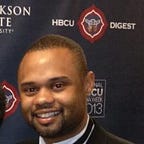HBCU Sports and the Culture We Keep
An internal investigation into academic fraud at varying levels at the University of North Carolina reveals that athletes were given paper classes and preferential treatment for the better part of 18 years. It remains to be seen what kind of punishment the NCAA will mete out for the Tar Heels, but the salacious story introduces an interesting discussion on the cross sections of education, business, race and morality — and the Black athletes at the center of it all. For all of the rhetoric about ineffective leadership, outdated missions and low-resources at HBCUs, there is a guilty pleasure to be had in reading this story of teachers, coaches, boosters, administrators and athletes behaving badly.
HBCUs get a lot of things wrong, and usually because the tools and personnel necessary to do things right are hard to come by and nearly impossible to afford. But what HBCUs typically don’t do, regardless of size, mission, geography or endowment, is cheat and exploit Black athletes, and particularly Black men, out of education.
The biggest known HBCU grade changing scandal went down at Southern University more than 10 years ago. More than 500 students were implicated in paying an assistant registrar in manipulating grades and transcripts to receive degrees. But that issue was centered around the athletic department, and was never an operation orchestrated and endorsed by more than one wayward academic executive.
Cheyney University received strong penalties earlier this year, when the NCAA revealed that its department of athletics maintained poor records and allowed ineligible athletes to compete in games across a number of sports. These are notable outliers, but its rare to hear about massive grade changing scandals to keep Black athletes eligible for play at HBCUs. The academic culture at Black colleges is built on phrases bellowed out in lecture halls and classrooms: “no free ride,” “you won’t cheapen my degree,” or “I earned mine, and you have to earn yours.”
But over the same period of these two schools’ transgressions, Florida State University, Auburn University and Louisiana State University are just a handful of recent BCS national champions to have stepped into the cesspool of academic fraud.
From historic and contemporary angles of achievement, Black colleges typically don’t give too many free passes on classroom performance. Culture won’t let our professors and administrators simply concede that the business and profile of sports means enough to send an unprepared student out into the world with limited expertise and skill. Ethnic pride won’t allow a professor to allow an athlete to receive unearned access, privilege or credentials, because the professor knows the end result isn’t a raised comfort level on campus, but an undignified career arc that awaits beyond the campus gates.
Perhaps that is why so many HBCUs struggle with the NCAA Academic Progress Rate; low-resources and disproportionate metrics aside, a Black college has zero problem with a student flunking or transferring out if his academic performance isn’t up to standard. It is the core of the infamous, nearly universal HBCU freshman orientation speech.
“Look to your left and look to your right; somebody is not going to be here four years from now.”
It’s one thing if an athlete is committed to avoid learning, but something totally different for an HBCU to endorse and orchestrate his professional demise for him. It’s the same principle that prohibits alcohol on campus, and limits open co-ed visitation — from an institutional perspective, students will be the sole proprietors of their own campus-based sin and stupidity.
There are many things upon which HBCUs can be judged; some of them fair arguments, and some of them fair but missing appropriate economic and social context. But when scandal sweeps the higher education landscape, and HBCUs tend to be at the front of the rush, we should remember that Black colleges don’t get everything wrong.
Especially when larger, whiter schools seem to make a nasty habit of exploiting Black athletes in the name of money, championships and exposure.
style=”display:block”
data-ad-client=”ca-pub-5494528208355176"
data-ad-slot=”5957960395"
data-ad-format=”auto”>
